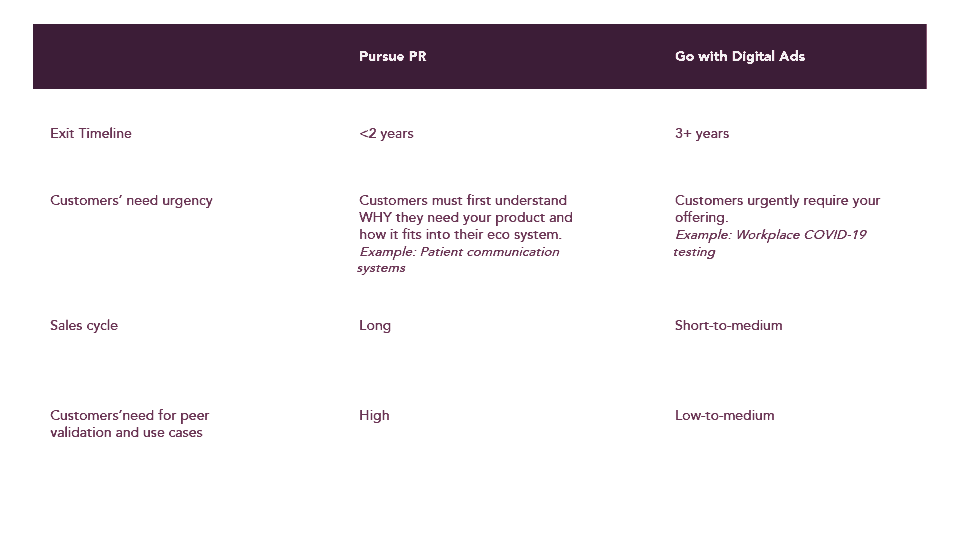Newly-funded startups or companies launching their first marketing engagement often struggle with which marketing channels to pursue for a given budget. After website optimization, content generation, and email campaigns, they often struggle with whether to invest in public relations or digital marketing.
The public relations option: earned media
The most common form of public relations small and midsize business (SMB) companies first engage in is earned media, which is free editorial coverage.
Coverage in national, local, and trade publications plays an important role in getting the word out to target personas about your news, brand, services, and innovations. Your PR agency will get an article profiling a use case published in Modern Healthcare or The Wall Street Journal quoting your CEO or client in an article.
Digital advertising options
Digital advertising can take many forms. For B2B healthcare tech companies, it’s most often paid social advertising (e.g., LinkedIn Ads), pay-per-click advertising (Google or Bing Ads), and paid lead generation campaigns through trade publishers.
A PR vs. digital advertising decision matrix
When deciding which marketing channels to invest in, high-level business goals and your clients’ customer journey are the most important parameters. Below is a decision matrix we use to advise clients on which path to pursue based on four criteria:
Exit timeline is the window in which you wish to divest from the business through acquisition or merger. I like PR for companies that have short exit windows because it can significantly improve brand recognition, and in turn, valuation.
But PR is not a lead generation channel on its own. Companies with longer exit horizons typically want revenue growth over brand recognition. For these firms, I recommend digital ads.
Customers’ need urgency involves how quickly the customer needs your product to solve a problem or address a key challenge. Complex educational sales usually have low urgency, even if they have high strategic importance.
I like PR for high-priced, complicated platform sales when the selling company can get its marquee customers to talk on the record. An earned media piece detailing a case study at Cleveland Clinic will get a lot of eyeballs and can be used in email marketing automation and inbound campaigns.
If you have a product or service that customers needed yesterday, then digital advertising is a better bet because your prospects will actively be scouring the web for solutions to their critical pain points.
Sales cycle is a series of events and the timeline involved in a sale. If your sales cycles are long, your customers most likely will require many pieces of validation content. Earned media can play an important sales enablement role.
If your products have a short sales cycle, the amount of information you’ll need to provide will be small, and often you can convert quickly via digital ads on only 1-2 pieces of content.
Customers’ need for peer validation is how important objective, verified assets like customer case studies and testimonials are to closing a deal. If your customers need to see verified proof that their peers love your product or service, then seeing that validation in print is worth gold.
On the other hand, if your customers buy more on gut and vendor relationships, then digital marketing will fill your funnel faster.
The glaring parameter that’s not in the matrix: patience
The one overarching element not in the matrix that often is the tipping point is how patient your C-level is and their expectations of marketing. If they expect quick filling of the sales funnel, then PR is not going to make them happy.
If, on the other hand, the C-suite has a long-term philosophy of building a best-in-class brand, and having that brand drive sales, then earned media is a fantastic channel.
Need a marketing strategy to support your goals?
That’s where Clarity Quest comes in. We have seasoned healthcare and biotech marketing leaders ready to create a marketing plan that reviews and allocates your marketing budget to make sure you realize your business objectives.
View our marketing strategy, digital advertising, and PR services.



